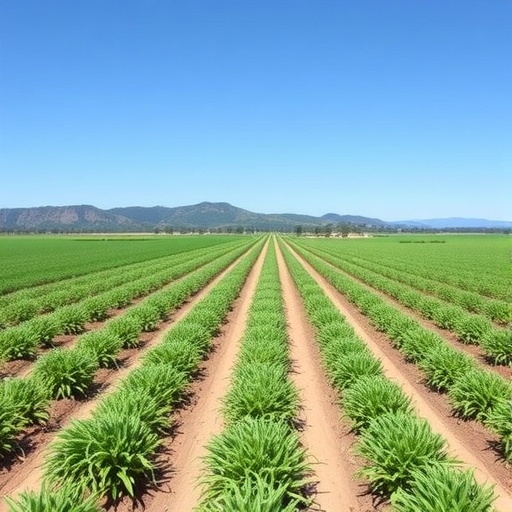As global temperatures rise and climate change accelerates the frequency and severity of droughts worldwide, agricultural systems face an unprecedented crisis. A transformative new study published in Agricultural Ecology and Environment presents a compelling argument that the future of crop resilience lies not predominantly in the genetic manipulation of drought tolerance traits but rather in the strategic management of water resources. Led by researchers Sha Zhang and Yuang Guo, affiliated with the Chinese Academy of Sciences and Princeton University respectively, this work critically reassesses the mechanisms of agricultural adaptation under water scarcity.
Conventional wisdom has long emphasized the development of genetically enhanced drought-tolerant crop varieties as the frontline defense against drought-induced yield losses. However, the study meticulously demonstrates that no matter how advanced these genetic improvements become, plants fundamentally require a baseline level of water to sustain physiological functions essential for growth. Photosynthesis, nutrient transport, and reproductive processes are all contingent upon sufficient soil moisture; without this, even the most drought-hardy cultivars fail to thrive.
The researchers support their thesis by examining detailed case studies from recent historic drought events spanning multiple continents. For instance, the severe drought of 2012 in the United States decimated corn and sorghum yields by nearly 30%, despite the widespread adoption of genetically drought-tolerant hybrids. Similarly, drought conditions in Argentina between 2022 and 2023 caused catastrophic declines in soybean and peanut production, plummeting over 40%. Comparable patterns of crop failure due to extreme moisture deficits were observed in Zambia, China, and across Western Europe, underscoring the limited protective capacity of genetic interventions when soil moisture plummets below critical thresholds.
In stark contrast to genetic approaches, the study highlights that integrated water management—encompassing techniques such as advanced irrigation infrastructure, rainwater harvesting, and soil conservation—consistently enhances crop performance and yield stability. These strategies function by optimizing water availability, improving soil retention, and reducing evapotranspiration losses. For example, in Burkina Faso, simple yet effective measures such as contour stone bunds and the creation of planting pits have enabled farmers to more than double yields, all without resorting to new drought-tolerant seed varieties. Such grassroots water management innovations demonstrate scalable, cost-effective pathways toward resilience in semi-arid and drought-prone regions.
The paper further elucidates that the synergy between genetic enhancements and water management is critical. Genetic drought tolerance traits unlock higher productivity only when matched with reliable water supply mechanisms. Trials in India combining improved maize varieties with deficit irrigation protocols achieved production increases exceeding 20%, a clear indicator that genetics and water availability are interdependent rather than mutually exclusive solutions. This integrated approach addresses the physiological limits of plants under water stress, ensuring that advancements in plant breeding are fully realized in the field.
Beyond yield security, the authors draw attention to cascading ecological benefits arising from sound water governance. Water-saving irrigation methods are instrumental in reducing methane emissions, particularly in water-intensive rice cultivation. This dual impact positions water management as a linchpin not only for climate adaptation but also for climate mitigation, effectively linking agricultural productivity with broader environmental sustainability targets.
An urgent call is made for policy frameworks and financial investments geared toward modernizing irrigation systems, enhancing rainwater capture, and rehabilitating degraded soils globally. The researchers argue that existing infrastructure deficits and weak governance mechanisms critically undermine these efforts, limiting farmers’ capacity to secure dependable water access. Overcoming these challenges is posited as essential for safeguarding global food security against the backdrop of intensifying drought regimes.
The lead authors emphasize a paradigm shift in adaptation strategy formulation: water must become the centerpiece of climate resilience efforts, with genetic innovation positioned as a complementary tool rather than a standalone solution. This realignment prioritizes tangible water resource interventions and infrastructural upgrades, fostering an environment where biotechnological advances can reach their full potential in elevating crop performance under stress.
This perspective signals a departure from high-tech reliance on genetic engineering toward a holistic, systems-based approach that integrates agroecological principles with engineering solutions. It calls on governments, research institutions, and development agencies to rethink resource allocation and programmatic focus to emphasize water security as foundational to future agricultural productivity.
In conclusion, the study by Zhang and Guo articulates a clear, evidence-based hierarchy of drought adaptation priorities that elevate water management above genetics in the resilience agenda. Reliable access to water, supported by coordinated infrastructure and sound policy, emerges as the sine qua non for effective adaptation to climate-induced drought. Only by fully harnessing this resource alongside genetic and agronomic innovations can global agriculture withstand the escalating challenges posed by a rapidly warming planet.
Subject of Research: Not applicable
Article Title: Water first: why effective water management outweighs genetic drought tolerance in agricultural adaptation
News Publication Date: 17-Sep-2025
Web References:
http://dx.doi.org/10.48130/aee-0025-0002
References:
Zhang S, Guo Y. 2025. Water first: why effective water management outweighs genetic drought tolerance in agricultural adaptation. Agricultural Ecology and Environment 1: e004
Image Credits: Sha Zhang, Yuang Guo
Keywords: Water management, Climatology, Food security, Food resources




